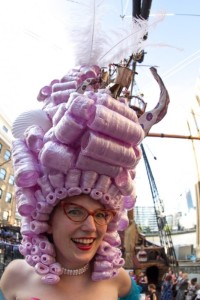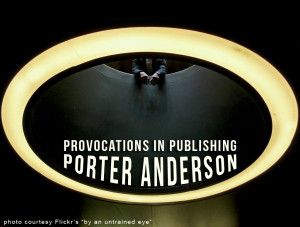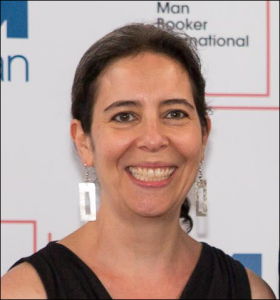3 Hashtagged Sermonettes for Writers
By Porter Anderson (@Porter_Anderson) | June 16, 2017 |

Inside Duomo di Milano. Image – iStockphoto: Anshar
#CreditWriters
You may have heard me rail about how strange it is that authors are so bad about crediting their fellow writers.
 Consider this sentence: “The Washington Post says the special counsel is investigating Trump for possible obstruction of justice.” That’s wrong. The Post doesn’t say that, its writers do. The Washington Post–newly returned to us as a crucial journalistic voice, under the ownership of Amazon’s Jeff Bezos–has never written a single story. Neither has The New York Times. Nor the LA Times. Nor The Sunday Times, the Associated Press, Reuters, CNN, or your local medium of choice.
Consider this sentence: “The Washington Post says the special counsel is investigating Trump for possible obstruction of justice.” That’s wrong. The Post doesn’t say that, its writers do. The Washington Post–newly returned to us as a crucial journalistic voice, under the ownership of Amazon’s Jeff Bezos–has never written a single story. Neither has The New York Times. Nor the LA Times. Nor The Sunday Times, the Associated Press, Reuters, CNN, or your local medium of choice.
People write stories. They’re our colleagues. That Post piece is by four of them:
There’s that sermon, then. Go forth and #CreditWriters, amen.
#PicturesMeanBusiness

Sarah McIntyre
Next, consider the difficulty that many in the business have had in crediting illustrators, too, of all the preposterous things. Part of the issue here is metadata fields. It became apparent at one point that templates didn’t always have a place to fill in the name of an illustrator on a book, which is ridiculous. The last thing the industry expected was illustrators? Really?
That’s never been an excuse for publishers who don’t put the names of illustrators onto the covers of books with authors’ names. Especially in children’s work, these gaffes cripple illustrators’ careers, making it incredibly hard for them to attract editors and design directors looking for new illustration work.
Many publishers are trying to address this, and we can applaud them. Consciousness is rising, thanks to the campaign led from England by the Seattle-born author and illustrator (and energetic dresser) Sarah McIntyre. #PicturesMeanBusiness.
So there’s that sermon. #PicturesMeanBusiness, amen and amen.
#NameTheTranslator

Provocations graphic by Liam Walsh
And here’s today’s benediction, my provocation for you. Let’s talk about translators. More to the point, let’s talk about them as much as we talk about the authors they translate.
That’s the position of the “new” Man Booker International Prize, and I salute it. I think you should, too. I’m calling it “new” because it’s just named its second winning set of an equally honored author and translator.
The organization in England likes to say this is the “evolved” format of the prize. From 2005 through 2015, the international edition of the coveted Man Booker Prize was given every two years for a body of work. Recipients included Alice Munro and Philip Roth. They’re no slouches. But in 2016, the new protocol was introduced: the prize hands £50,000 (US$63,000) to both the winning author and translator for a single work. And they split it. Evenly. Bravo.
Wednesday evening (June 14) when I talked to the winning Israeli author David Grossman and British translator Jessica Cohen from the Victoria & Albert in London just after they’d won, it was completely right to have them both to interview, and together. They won for A Horse Walks Into a Bar published in the States by Alfred A. Knopf.

David Grossman
Grossman had told me that writing his astonishing character, Dovaleh, a stand-up comedian in crisis, was like riding a rodeo horse, requiring him, Grossman, to just get out of the way. In some of our conversation that I didn’t get to report yet, Grossman told me:
“I like such harsh and not-yielding-easily characters. Because I always think that it’s me who’s not mature enough or intelligent enough to understand the character. I have to peel off layers of cataracts from my soul in order to be in total naked contact with the characters. I know now that it takes years to get to this point where I can be the really right distance between me and the character.”
Peeling cataracts from his soul. That’s the way this extraordinary author speaks to you in a conversation in English. Imagine what he does in his native Hebrew on the page.

Jessica Cohen
That’s where translator Cohen comes in. A Horse is her fifth Grossman translation. She knows what to do with his voice, which is “always very challenging,” she told me, “always difficult…everything from biblical to extremely colloquial.”
Because the novel hands you a stand-up comic in meltdown, “There are jokes,” she said, “but that doesn’t mean it’s a funny book.”
And I asked Cohen if she writes her own work? She didn’t miss a beat:
“I do not produce my own material. I am a writer, because all translators are writers. But I don’t do my own original material. We translators get to tell other people’s stories.”

Andrew Wylie. Image: FIL Guadalajara, Ana Loreno Mendez
In my interview with the arch-agent Andrew Wylie today, he tells me that he senses, as many of us do, that more Americans are reading translated work now, partly in resistance to the era’s political isolationism. This is great. And as the work of publishers like Gabriella Page-Fort’s seven-year-old imprint AmazonCrossing shows us, translation today is publishing’s new token of internationalism, the best impetus of its moral importance during times of such surreal political peril.
When you read a translated work, and I hope you’ll read many, learn the translator’s name as well as the author’s. If both names aren’t on the cover, drop a tweet into the wild about it, let the publisher know that you’ve noticed and aren’t happy about it: call that publisher out.
When you speak about what you’ve read, always be sure to #NameThe Translator, and go in peace.
And as the congregation leaves the sanctuary, let me know: Why do you think people in publishing are so negligent about giving credit where it’s due? Surely we can do better. What do you think it will take?
[coffee title=”Wish you could buy Porter a glass of Campari?” icon=”glass”]Now, thanks to tinyCoffee and PayPal, you can![/coffee]









Amen to all that. I can’t speak to the translator aspect, but I can say with regard to sources I do my best even in a blog post or tweet to give credit where it’s due. I find images on the web can be difficult to trace to the creator but I usually dig as deep as I can until I can find at least the source. Or (even better) I intentionally seek out artists I know and want to give some exposure to, in the spirit of cross-pollination. I am an amoeba when it comes to assimilating knowledge from various sources, but I also do my best to extract statements that have become my opinions as a result of reading a great book or article, again in the spirit of pointing readers to the same great sources that have given me some valuable insights. After all, who wants to listen to someone rant on with their own opinions? Better to hear those opinions and see how they were shaped so, if you disagree, you can at least go to the source and learn further. This is the web after all, and the more interlinked the better.
Hey, John,
Thanks much for the input here.
I especially like your concept of the “cross pollination” of crediting someone, being in touch with them, helping to raise their visibility.
That is, yes, the promise of the Internet and and I’m constantly amazed (okay, maddened) by people who don’t understand the importance of linking things in their work. Why be on the Net, a network, if you’re not interested in networking?
Looking forward to 20 years from now when all the confusions, misconceptions, and general stupidity around the Web will be behind us. But it’s going to be a long 20 years.
Keep doing what you’re doing, and thanks!
-p.
On Twitter: @Porter_Anderson
Guilty as charged and with the proliferation of writers, photographers and online news sites it only increases. In this political climate, I read and tweet every day. Guilty, because with 140 characters WAPO and NYT allow for more content. I admire Rachel Maddow who has writers from these publications, like Adam Entous who you mentioned, and always gives them the credit they deserve. After a while I know these guys! The fourth estate works hard. So do photographers and translators. I’m making a note on that last one. Your post matters. Thanks.
Hey, Beth,
Thanks for taking such good note of the situation — and also simply for reading and spreading the word on the work of these journos whom you do indeed come to know.
It’s an important time of resurgence for our media people and many of us are hoping that this can help propel the news industry into a more (lasting) prosperous phase. Anything done now to help bring specific credit and support to good work is going to aid in that effort to re-establish the Fourth Estate in its critical position in our culture.
That said, you’re not alone in finding it hard at times to get it all in, especially when a lot of critical reporting is done by teams of journalists (like the quartet on the Post piece I mentioned). Sometimes in cases like that, I’ll rotate several tweets about the story, crediting one of the writers each time.
Some of the biggest offenders are news and other media, themselves, belching out tweets about their content without honoring their writers. (And I have a longstanding objection to The Economist’s bald-faced policy of allowing no bylines on its stories. Similarly some of the wire services’ contracts allow news media to carry their content without crediting their writers, a disgusting but long-standing thing.)
We do our best, and you’re certainly pulling your weight in this regard. Maybe the best thing to do is to keep spreading the word to folks who haven’t thought of it (sometimes that’s all it is) to #creditwriters, #namethetranslator and #picturesmeanbusiness.
Thanks, as ever, for reading and responding!
-p.
On Twitter: @Porter_Anderson
Thanks, Porter. Making a note of those hashtags and will work with them. The tweet world is so vast, but even a drop in the pool just might help. Hurrah for the 4th Estate, they might just save us. Oh and often I go and follow a writer, look to see if he or she tweets. I think that helps too.
Wonderful post, Porter. A good friend, Jim Fusilli, writes for the Wall Street Journal, reviewing music, specifically rock and jazz. And that conjunction strikes many as so odd that I normally refer to both whenever I pass along one of his pieces — not enough people know Jim by name to realize his stature, and people almost instinctively disregard the WSJ if the subject isn’t politics or finance.
Also, over on David Simon’s twitter feed today, he retweeted a thread by journalist Ginger Thompson about the incredible peril Mexican journalists face just doing their jobs. It can seem like a vague horror story until you learn those journalists’ names, and read their stories. Incredibly brave men and women, as are those who continue writing: Lydia Cacho, Anabel Hernandez. It’s important to put a name and a face to those doing such important and dangerous work.
P.S. Isn’t it odd how often we only take note of a translator when the translation is bad?
Right, excellent point. I call this the “lighting designer problem.” When a lighting designer’s work is good in a stage production, you don’t know it’s there. You just see beautifully lit sets and people. When something’s wrong, you’ll complain through the whole intermission about the bad lighting job, l.ol.
-p.
On Twitter: @Porter_Anderson
Hey, David,
Thanks so much for these good comments, right on every point.
It’s especially helpful that you’re lifting up Fusilli’s work as you’re doing, not only because (you’re right) no one expects such coverage from the @WSJ (one of the most marvelously short Twitter handles out there! lol) but also because critics’ names are particularly frequently ignored. In an article on a book in translation, I just read, “’A Great Indian Novel Reaches American Shores’ is how The New York Times publicized its review.” Of course “publicized” is wrong — that’s a headline, they’re quoting. And the critic is Pabul Sehgal, not the Times, which has never reviewed anything at all: only its critics have and every single one of them has a name. :) (Here’s Sehgal’s review https://nyti.ms/2slRUp7 )
Having spent my career as a critic ( “The Village Voice review says…” ), I’m especially sensitive to this.
And even Friday, as I was writing this article, Michael Cader at Publishers Lunch made a very nice reference to my Andrew Wylie interview (https://bit.ly/2tdvKpe) , but he wrote that Wylie was “interviewed by FBF’s Publishing Perspectives.” No, he was interviewed by me. Publishing Perspectives, of which I’m the editor in chief, interviews no one and writes nothing. My correspondents and I do those things. :) Just for the record.
As I was saying to Beth, one problem is that the various media generally don’t credit their own writers in social media. They don’t set the automatic tweets (which many lazier tweeteurs use) to include the byline. Just headline, link, and the medium’s own handle. So one has to edit those things and insert the writer’s name (often having to look it up), which is more than many will do.
Excellent point on the Mexican journalists piece. At the highest level, this is just another manifestation of how little regard the world has for artistic endeavor and credit. (It’s why everybody leaves the cinema rather than sitting through the credits at the end.) In some culturally accepted ways like this, we’re just not all very nice people, it turns out.
What a surprise. :)
Cheers, David,
-p.
On Twitter: @Porter_Anderson
Back in the 80s, I art directed a magazine. If one of my designers forgot the illustration credit, I sent them down to the lobby newsstand to buy me a Coffee Nip (and, of course, put in that credit).
Good for you, Mary.
And I bet you got a lot of free Coffee Nips, too. :)
Cheers,
-p.
On Twitter: @Porter_Anderson
well said, and let’s not forget the editors.